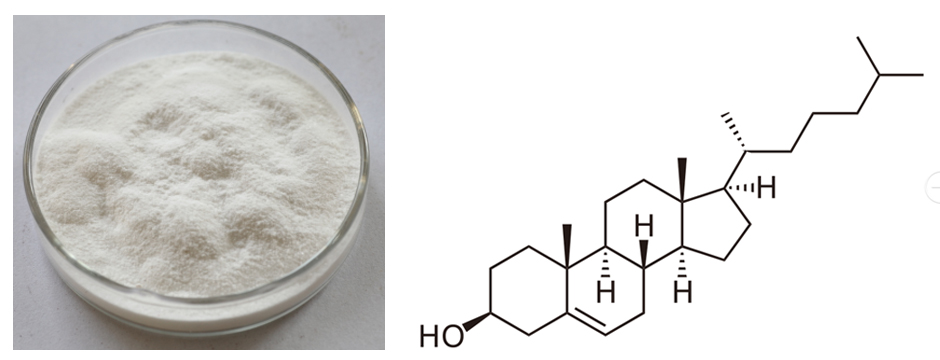Good Quality for Phytosterol Manufacturer in Mauritius
Good Quality for Phytosterol Manufacturer in Mauritius Detail:
[Latin Name] Glycine max(L.) Mere
[Specification] 90%; 95%
[Appearance] White powder
[Melting point] 134-142℃
[Particle size] 80Mesh
[Loss on drying] ≤2.0%
[Heavy Metal] ≤10PPM
[Storage] Store in cool & dry area, keep away from the direct light and heat.
[Shelf life] 24 Months
[Package] Packed in paper-drums and two plastic-bags inside.
[Net weight] 25kgs/drum
[What is Phytosterol?]
Phytosterols are compounds found in plants that resemble cholesterol. The National Institutes of Heath report that there are over 200 different phytosterols, and the highest concentrations of phytosterols are found naturally in vegetable oils, beans and nuts. Their benefits are so recognized that foods are being fortified with phytosterols. At the supermarket, you may see orange juice or margarine advertising phytosterol contents. After reviewing the health benefits, you may want to add phytosterol-rich foods to your diet.
[Benefits]
Cholesterol-Lowering Benefits
The most well-known, and scientifically proven, benefit of phytosterols is their ability to help lower cholesterol. A phytosterol is a plant compound that is similar to cholesterol. A study in the 2002 issue of “Annual Review of Nutrition” explains that phytosterols actually compete for absorption with cholesterol in the digestive tract. While they prevent the absorption of regular dietary cholesterol, they themselves are not easily absorbed, which leads to a total lower cholesterol level. The cholesterol-lowering benefit does not end with a good number on your blood work report. Having lower cholesterol leads to other benefits, such as a reduced risk for heart disease, stroke and heart attacks.
Cancer Protection Benefits
Phytosterols have also been found to help protect against the development of cancer. The July 2009 issue of the” European Journal of Clinical Nutrition” offers encouraging news in the fight against cancer. Researchers at the University of Manitoba in Canada report that there is evidence that phytosterols help prevent ovarian, breast, stomach and lung cancer. Phytosterols do this by preventing the production of cancer cells, stopping the growth and spread of cells that are already in existence and actually encouraging the death of cancer cells. Their high anti-oxidant levels are believed to be one way phytosterols help fight cancer. An anti-oxidant is a compound that fights free radical damage, which is negative effects on the body produced by cells that are unhealthy.
Skin Protection Benefits
A lesser known benefit of phytosterols involves skin care. One of the contributing factors in the aging of the skin is the breakdown and loss of collagen — the main component in connective skin tissue — and sun exposure is a major contributor to the problem. As the body ages, it is not able to produce collagen as it once did. The German medical journal “Der Hautarzt” reports a study in which various topical preparations were tested on skin for 10 days. The topical treatment that showed anti-aging benefits to the skin was the one that contained phytosterols and other natural fats. It is reported that phytosterols not only stopped the slow-down of collagen production that can be caused by the sun, it actually encouraged new collagen production.
Product detail pictures:

Related Product Guide:
We also offer you product sourcing and flight consolidation expert services. We've our personal manufacturing unit and sourcing business. We can offer you virtually every variety of merchandise associated to our item range for Good Quality for Phytosterol Manufacturer in Mauritius , The product will supply to all over the world, such as: Salt Lake City, Cyprus, Rio de Janeiro, Thus far, our item associated with printer dtg a4 may be shown in most foreign nations as well as urban centers, which are sought after simply by targeted traffic. We all highly imagine that now we have now the full capacity to present you with contented merchandise. Desire to collect requests of your stuff and produce the long-term co-operation partnership. We very seriously promise:Csame top quality, better price; exact same selling price, higher quality.
Get ALL the recipes in PDF form: https://bit.ly/FallDayRecipes
Get the pumpkin spice donut recipe here: https://bit.ly/PumpSpiceDonuts
Get the chipotle squash soup recipe here: https://bit.ly/ChSqSoup
Get the quick caramel corn recipe here: https://bit.ly/CarmCorn
PUMPKIN SPICE DONUTS:
FOR THE DONUTS
- 1/3 cup oil
- 4 tablespoons butter
- 1 cup white sugar
- 3/4 cup brown sugar
- 3 eggs
- 1 15 ounce can pumpkin purée
- 1 1/2 cups flour
- 1 3/4 teaspoon baking soda
- 3/4 teaspoon cinnamon
- 1/2 teaspoon ginger
- 1/4 teaspoon grated nutmeg
FOR THE GLAZE
- 1 cup powdered sugar
- 1/2 teaspoon cinnamon
- 3-5 tablespoons apple cider
INSTRUCTIONS
Preheat oven to 350 degrees.
Melt butter and add to oil in large mixing bowl. Add sugars and mix with a hand or stand mixer.
With mixer running, add eggs one at a time, mixing after each addition.
Mix in vanilla and pumpkin.
Finish batter by adding flour, baking soda, cinnamon, ginger and nutmeg. Mix until no dry streaks remain.
Spray donut pan with nonstick baking spray and fill forms 3/4 full of batter.
Bake in preheated oven 12-18 minutes until the donuts are set and slightly browned around the edges.
Remove from oven and cool in pan for 5 minutes then turn out onto a cooling rack. Continue baking donuts until all batter is used.
While baking, prepare glaze by whisking together all ingredients until smooth.
When the donuts are cooled, dip in prepared glaze.
CHIPOTLE SQUASH SOUP:
FOR THE SOUP
- 3 tablespoons olive oil
- 1 large onion, diced
- 1 teaspoon salt
- 1 cup diced carrots
- 1 1/2 teaspoons ground cumin
- 1 cup carrot juice
- 4 cups chicken stock
- 1 quart diced tomatoes in tomato juice
- one large roasted squash, scooped out and skin discarded
- 2-3 chipotle peppers in adobo
FOR THE CHIPOTLE PUMPKIN SEEDS
- 1 cup raw pepitas (pumpkin seeds)
- 2 tablespoons olive oil
- 1 1/2 teaspoon salt
- 1 teaspoon minced rosemary
- 1-3 teaspoons chipotle pepper powder
FOR THE SOUP
In a 5 quart kettle, heat oil over medium high heat. Add onion and salt and sauté until slightly softened, 3-5 minutes.
Add carrots and cook an additional 6 minutes.
Stir in cumin for 30 seconds.
Add tomatoes, carrot juice, chicken stock, squash and peppers.
Bring to a boil then turn to a simmer and cook for 45 minutes with lid slightly ajar.
To finish soup, blend using an immersion blender or regular blender until smooth. Garnish with chipotle pumpkin seeds.
FOR THE CHIPOTLE PUMPKIN SEEDS
Stir together all ingredients and bake in a preheated 375 degree oven until the seeds begin to pop and are toasted, 12-15 minutes. Set aside and cool.
QUICK CARAMEL CORN:
INGREDIENTS
- 1 stick unsalted butter
- 1/4 cup light corn syrup
- 1 cup brown sugar
- 1/2 teaspoon salt
- 1/2 teaspoon baking soda
- 5 quarts popped popcorn
INSTRUCTIONS
Preheat oven to 200 degrees and spray two baking sheets with nonstick cooking spray. Set aside.
Have popcorn popped and ready in a large bowl.
Bring butter, corn syrup, brown sugar and salt to a low boil over medium high heat. Continue boiling for 2 minutes.
Remove from heat and stir in baking soda. Continue stirring until soda is incorporated and the caramel is lighter in texture.
Pour over prepared popcorn and stir until the popcorn is evenly coated.
Evenly divide on two baking sheets and place in preheated oven. Bake for 45 minutes, stirring every 15 minutes.
Remove from oven, cool and enjoy!
Want to save $5 off for free on any nutritional product? Go to www.iherb.com and use my coupon code REK978 to receive $5 off for free on any first purchase. Sign up with iherb today it’s free! When you sign up you will get your own coupon code and will be able to help others save money and you can receive a 4% commission! So what are you waiting for? Start making money now and help others save money! ![]()
Sangre de drago reigns among the most legendary botanicals from the Amazon Rainforest. For centuries, the sap of sangre de drago has been painted on wounds by Indigenous people to help stop bleeding and accelerate healing.*
Widely used in the Rainforest for its ability to assist skin regeneration and the health of body tissue, the dried sap of the sangre de drago tree contains 90% proanthocyanidins (OPCs).¹ Proanthocyanidins are the most potent dietary antioxidants known.
Promote natural anti-aging processes in the body with this Rainforest super antioxidant.
THIS STUFF WILL HELP ACNE, ACNE SCARS, WRINKLES, FINE LINES, HYPERPIGMENTATION, CUTS, BITES, REALLY ANY KIND OF SKIN PROBLEM. ALSO INTERNALLY ITS AMAZING FOR THE BODY!
MORE INFORMATION:
https://www.amazonherb.net/Herbs_Pages_SangreDeDrago.aspx
ALSO WATCH THESE VIDEOS:
BUY IT HERE:
https://bluenergi.amazonherb.net
This company has a lot of ready-made options to choose and also could custom new program according to our demand, which is very nice to meet our needs.







